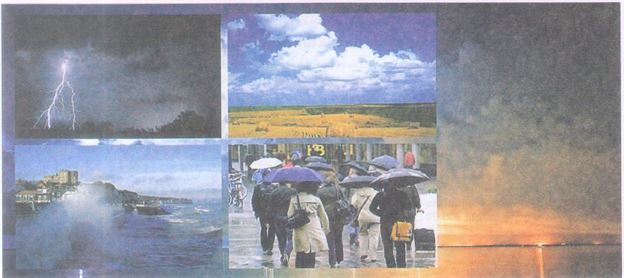fce listening about predicting the weather from the sky
گرامر کتاب اف سی ای درباره ی so , nor, neither

11 What on earth's going on?
Vocabulary 1: Weather

1 Describe the typical weather conditions in your area for each season.
2 All the words in each of the groups 1-7 below can be used with one of the nouns in the box to form strong collocations. For each group of words write the noun which can be used in the appropriate space. There is an example at the beginning (0).
sunshine showers sky storm clouds rain winds
0 overcast
clear Sky
stormy
1 violent
severe
electric
2 fine
heavy
torrential
3 strong
gale-force
light
4 warm
brilliant
glorious
5 rough
calm
choppy
6 thick
storm
angry-looking
7 light
scattered
snow
3 Study the words in exercise 1 for two minutes. Then cover up the adjectives and see how many you can remember for each noun.
4 Complete each gap with a two-word adjective + noun collocation from exercise 2.
More than one answer may be possible. The first one has been done for you
1 There's a lovely clear sky tonight so we might see a shooting star.
2 Our garden wall was blown down during the night by .
3 Heavy will fall on high ground tonight, so skiers can look forward to a good day on the slopes tomorrow.
4 It's going to rain - there are some very overhead. Look at them.
5 has caused serious flooding throughout the region.
6 We sailed on a beautiful with not a wave in sight.
5 Describe the photos above using as many of the adjective + noun collocations as possible. What types of weather do you prefer? What weather conditions do you least like?
Listening 1
Part 2
Sentence completion 2.22
1 How often do you watch, read or listen to the weather forecast? Why?
How accurate do you think the weather forecasts are for your area?
2 You will hear an Irishman called Michael Gallagher giving a talk about the traditional methods he uses to forecast the weather. For questions 1-10, complete the sentences.

You can read more about these in my book, which is called Traditional Weather Signs, but I'll give you a few examples now of what's in it. Let's start with birds. Birds are very sensitive to changes in the weather, and we can learn a lot from them. For example, swallows flying low are a sign that rain is on its way, and so are crows if they're flying in groups. But swallows flying high tell us that the weather's going to get better.
Cats, too, can help us predict [he weather, particularly if they're sitting by the fire. A cat washing its face there is a sure sign of wet weather. But if it's sitting with its back to the fire, then you know that frosty weather is coming. Farm animals are good indicators, too. Cows, horses, goats, sheep - you just have to watch the way they behave. Cows, for instance, they don't stay in the middle of a field if thev sense a storm approaching, and neither do horses or donkeys. If you see them grazing with their backs to a hedge, you know the weather's going to turn bad.
Now some of you will know me from my longer-range forecasts, which are reported in the media from time to time. Last year, for example, I got it right when I said we were going to have a warm summer in Ireland. Now I knew that, because the, sheep on the low ground started heading / back to the hills in late spring to graze and that's always an indication that the harsh winter and spring are over and good weather is on the way. And then I predicted that cold snap we had two winters ago,and I got that from a combination of events. The sheep were hungry, so they started coming off the mountains at the beginning of December to look for food. Then there was the fact that grass started growing as late as October on the lowland, and also the way the sun was shining on the mountains - it was giving off an orange glow. The sun, the moon, the stars - they've all been used to make predictions for centuries in rural Ireland. Many of us are familiar with the saying 'red sky at night, shepherd's delight', meaning that the weather will be fine tomorrow· if the sky is red at the end of today. But there's a whole lot more that can be predicted from what's up there above us. And you can read more about that in my book. Now I'm sure some of you would like to know what the weather's going to be like in the week ahead. Well, where I live we can expect some very heavy rain for the next three or four days. I noticed the frogs were coming out of the mud this morning and they weren't their usual bright green colour. They were much darker. Now that's a bad sign. As for this part of the world ...
Michael Gallagher has been predicting the weather for over (1) years.
Michael has gained a lot of his knowledge from local people, especially (2)
The title of the book that Michael has written is Traditional (3) .
Michael says that if you see swallows flying (4) it means the weather will improve.
A cat with its back to the fire is a sign that (5) weather is on its way.
If a storm is coming, cows, horses and (6) keep their backs to a hedge while eating.
Michael successfully predicted a warm summer by observing sheep moving towards the (7) at the end of spring.
The late growth of (8) in October helped Michael predict a cold winter.
One popular saying predicts good weather if there is a (9) at the end of the day.
Michael forecasts very (10) for his area over the next few days.
3 Would you have confidence in Michael's methods? Why/Why not?
Do you know any popular sayings in your country related to the weather?
Language focus 1: So, neither and nor
1 Read a and b, then answer the questions below.
a In these sentences from the listening, Michael expresses similarities in the way some birds and animals behave.
Swallows flying low are a sign that rain is on its way, and so are crows if they're flying in groups.
Cows don't stay in the middle of a field if they sense a storm coming, and neither do horses.
b These sentences express differences in the way some people behave or think.
I'll probably read Michael's book, but I know Rita won't.
She doesn't think traditional methods are reliable, but I do.
What determines whether so or neither is used when expressing similarities?
What determines which auxiliary verb is used, for both similarities and differences?
Check your ideas on pages 217-18 of the Grammar reference.
2 a Match each statement 1-8 with a reply a-h.
1 I'm not very interested in politics.
2 I don't know how to play chess.
3 Last night I didn't sleep very well.
4 Next week I'm going tostart revising for the exams.
5 I'd like to go for a drink now.
6 I've never been windsurfing.
7 I really enjoy going for long walks.
8 My favourite colour is green.
a So would I.
b I don't
c Neither are we.
d So is mine.
e Mark does.
f Nor did I
g So are we.
h Neither have I.
b Change the underlined part of each statement 1-8 to make sentences that are true for you.
c Read out the sentences you wrote in b. Respond to your partner using so, neither and nor.


